Thousands of miles of UK roads in poor condition
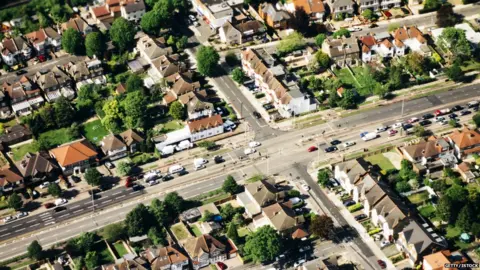 Urban Cow/Getty/iStock
Urban Cow/Getty/iStockSome 10% of the road network maintained by local authorities in Great Britain is in poor condition, or has been flagged for further inspection.
About 37,000 kilometres (22,990 miles) across England, Wales and Scotland fell below top standard in surveys carried out on behalf of the Department for Transport.
The RAC said the road network had suffered from years of underinvestment
The government said it was investing £6bn in improving local roads.
The analysis by the BBC Shared Data Unit comes as a separate investigation by the Asphalt Industry Alliance found more than 39,300 kilometres (24,400 miles) of road had been identified as needing essential maintenance in the next year.
Simon Williams, a spokesman for the RAC, said: "Before the cold snap the condition of many local roads was on a knife edge with many councils struggling to fix our roads properly.
"But now, as a result of the 'Beast from the East' some local roads will have deteriorated even further, possibly to the point that they represent a serious risk to the safety of users."

'I hit a pothole and suffered a bleed to the brain'
 BBC/Keith Ralph
BBC/Keith RalphKeith Ralph, a 37-year-old chef, was commuting through Lewisham in south London in January when he struck a pothole and was hurled from his bike. He was unconscious for more than a minute.
"It's completely out of the blue, I've been cycling in London for 15 years and have had a couple of close shaves with cars but nothing like this," he said.
Mr Ralph had CT scans which showed he had a bleed on the right hand side of his brain.
He had a splint put into his mouth during emergency dental treatment, which left him physically sick from the pain.
He also suffered a cut in his right eyebrow and his chin which required stitches, grazing to his legs and a severely bruised elbow.
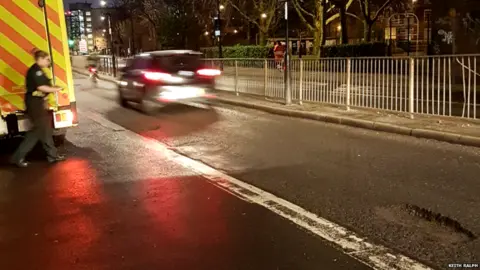 Keith Ralph
Keith Ralph"It has shaken me up a bit, unexpectedly hitting a pothole and coming out of hospital with those injuries," he said. "I was lucky the bleed on the brain was sorted out quickly."
Having cycled across London over a long period, Mr Ralph feels the condition of London roads is worsening.
"The roads and potholes are getting more repairs but it doesn't seem to be working and things are coming out quickly.
"In the very centre of London, the roads aren't as bad but it's the busier roads outside of the congestion zone that are definitely getting worse."

You may also be interested in:

The BBC's Shared Data Unit analysed the results of annual surveys, which measure the extent of defects such as bumpiness and cracking of the road surface.
In England and Wales, the survey measures the percentage of roads in a poor condition. In Scotland, it measures the percentage of roads in a poor condition, or requiring further inspection. Data was not available for Northern Ireland.
England
Some 3% (883km) of A-roads and 5% (14,420km) of minor roads across England in 2016-17 were deemed to be in a poor condition.
Over the past eight years, London and the South East were consistently the worst performing regions of the UK.
Thirteen out of 151 local authority areas saw an increase in the proportion of their road network deemed poor from 2009 to 2017.
They were York, Hartlepool, Wigan, West Sussex, Portsmouth, Stoke on Trent, Solihull, Barking and Dagenham, Kingston upon Thames, Bury, Stockport, Herefordshire and Manchester.
Julian Bell, who chairs London Councils' Transport and Environment Committee, said: "[We] recognise that road quality is an urgent concern and are committed to making improvements to the roads."
However, he said present funding was not enough to meet the needs of London's growing population.
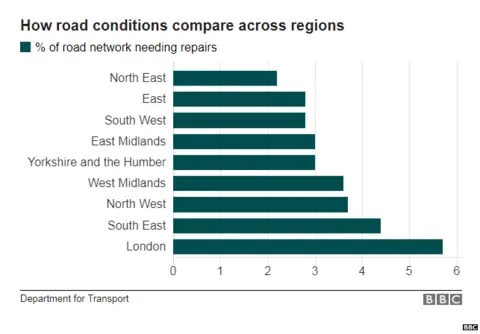
Wales
Some 10% of all roads in Wales were deemed to be in poor condition in 2016-17. That works out at 3,110 kilometres (1,930 miles) of road.
All local authority areas bar Gwynedd saw the proportion of roads in a poor condition fall in the six-year period. The condition of Conwy's roads remained roughly stable.
Some of the worst performing areas were Powys, Ceredigion and Wrexham.
A Welsh Local Government Association spokesman said there had been a downward trend in the proportion of roads deemed poor.
He said: "Clearly, local authorities would like to achieve a high standard on all the roads for which they are responsible.
"The network, as with many capital assets, experiences constant wear and tear and is exposed to a range of challenging weather conditions."
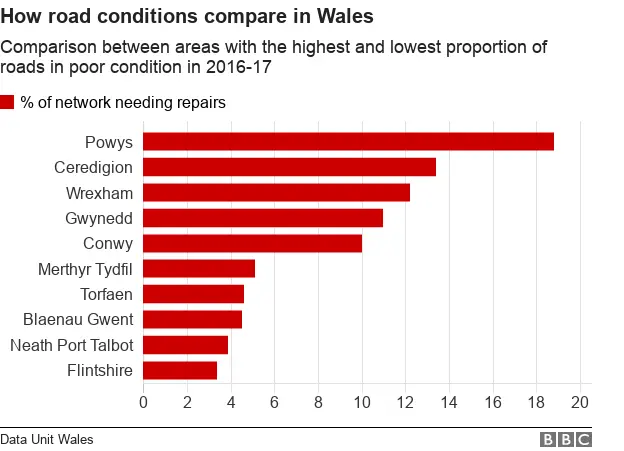
Scotland
In Scotland, some 30% of A-roads were either in a poor condition, or required further assessment. That works out at 2,220 kilometres (1,380 miles) of road.
Some 35% - or 16,500 kilometres of minor roads - were deemed in a poor condition, or earmarked for further inspection.
Some of the worst performing areas were Argyll and Bute, Eilean Siar, North Ayrshire, Inverclyde and Stirling.
According to the insurance firm, Admiral, claims for potholes and road defects in Scotland, were over two thirds higher in comparison to England.
Luke Bosdet, the AA's public affairs spokesman, said: "The poor condition of Scottish roads comes as no surprise. It is a long-running problem, often illustrated by the views of AA members."
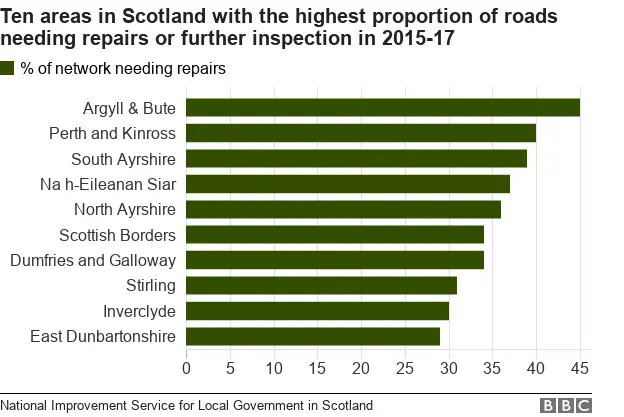
A UK government Department for Transport spokesman said: "This government is taking the big decisions for Britain's future and investing a record £23bn on our roads to improve journeys.
"We know that road surfaces are a concern for all road users and that is why we are providing local highway authorities in England with just under £6bn to help improve the condition of our local highway networks."
More about this story
The Shared Data Unit makes data journalism available to news organisations across the media industry, as part of a partnership between the BBC and the News Media Association.
For more information on methodology, click here. For the full dataset, click here. Read more about the Local News Partnerships here.
